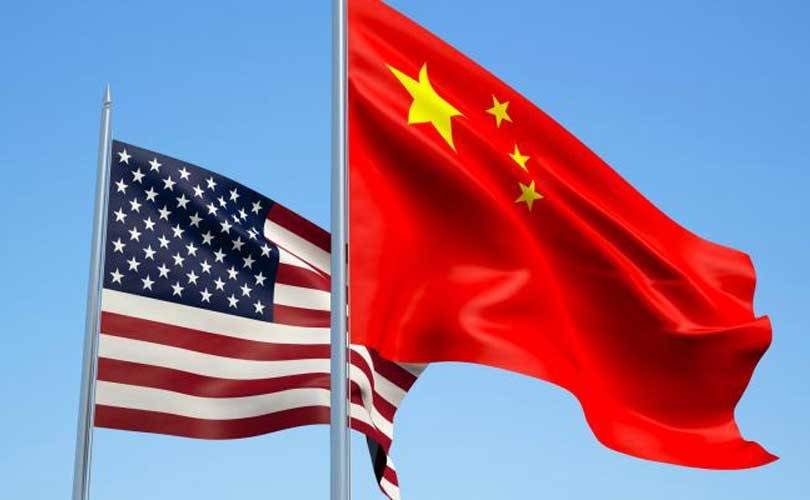
BEIJING — U.S.-China trade tensions are set for more predictability after Joe Biden’s presidential win — which likely means calmer rhetoric in a continued tough stance on Beijing.
Following years of brewing U.S. complaints about unfair business practices by China’s state-dominated system, President Donald Trump stepped up pressure on Beijing with policy measures that were often abruptly first floated through social media posts on Twitter. Ultimately, his administration levied tariffs on billions of dollars’ worth of Chinese goods and hurt Chinese telecommunications giant Huawei with sanctions.
“The issues that remain between the U.S. and China commercial relationship don’t change with (the) change of administration,” said Greg Gilligan, chairman of the Beijing-based American Chamber of Commerce in China.
“There’s pressure on both sides to remain fairly hawkish simply because domestic politics don’t allow for yielding the hawkish ground to someone else,” Gilligan said, referring to the tougher stance each country has on the other.
The world’s two largest economies signed a phase one trade agreement in January, bringing some reprieve to the tensions of the last two years. However, critics say China is behind on fulfilling agreed-to purchases of U.S. goods, while negotiations for a phase two deal have yet to start.
It’s also unclear how a Biden administration will handle tariffs, which have hurt businesses in both countries after China responded to U.S. duties with tariffs of its own.
“Everyone needs to keep their powder dry,” said Scott Kennedy, senior advisor and Trustee Chair in Chinese Business and Economics at the Center for Strategic and International Studies.
“There is a lengthy transition to go through and a pandemic to bring under control,” he said. “Perhaps we’ll see a continuing ceasefire in the trade war, but it’s way too early to know if the tariffs will be removed or the actions against Huawei and others will be undone.”
U.S.-China rivalry to remain
Analysts have pointed out that a Biden administration would be able to work with U.S. allies more effectively than Trump to pursue a more cohesive strategy against China. One of the few issues both Republicans and Democrats have come to agree on is tougher policy against the Communist Party-led country.
In his first speech as president-elect, Biden said he would focus on controlling the coronavirus pandemic. He did not mention China.
In keeping with a growing theme in both countries, the president-elect holds that “economic security is national security,” according to his foreign policy plan.
“The United States does need to get tough with China,” Biden wrote earlier this year in a “Foreign Affairs” article titled “Why America Must Lead Again: Rescuing U.S. Foreign Policy After Trump.”
“If China has its way, it will keep robbing the United States and American companies of their technology and intellectual property. It will also keep using subsidies to give its state-owned enterprises an unfair advantage — and a leg up on dominating the technologies and industries of the future,” he said in the article.
Biden added: “The most effective way to meet that challenge is to build a united front of U.S. allies and partners to confront China’s abusive behaviors and human rights violations, even as we seek to cooperate with Beijing on issues where our interests converge, such as climate change, nonproliferation, and global health security.”
Opportunity to collaborate
Hope is rising on both sides of the Pacific that more predictable foreign policy will offer more opportunity for some business cooperation.
“Biden is reasonable,” Xu Hongcai, deputy director of the Economics Policy Commission at the China Association of Policy Science, said in a phone interview, according to a CNBC translation of his Mandarin-language remarks. “Biden, Obama, they understand the basics of holding a dialogue.”
Xu noted “an end to the irrational era of Trump” and his use of tariffs, sanctions and other “crude” tactics for resolving problems of unfair trade practices. Instead, Xu said China could help the U.S. with infrastructure development and cooperate on international trade. He claimed that Beijing is already working to address issues such as restructuring state-owned companies, which the U.S. has been pressing for in trade negotiations.
‘Fragile’ but ‘more stable’ ties
While leaders of countries ranging from Germany to the United Arab Emirates were quick to congratulate Biden, Chinese President Xi Jinping has yet to do so. The Chinese leader had called Trump a day after his election win in 2016, according to state media.
Trump has so far refused to accept defeat. His campaign has filed lawsuits in several key states in an attempt to put the election results into question.